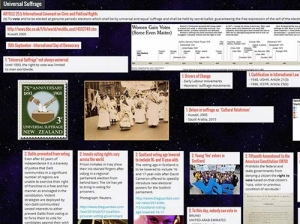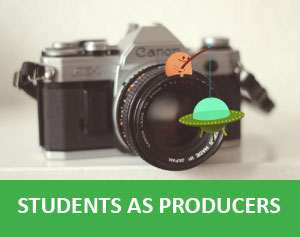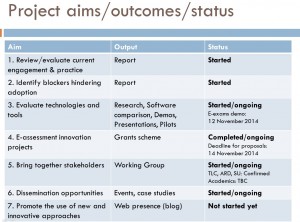Show and tell on students creating and sharing content
LTI show and tell on students as producers projects took place on the 30 April. Some common themes emerged amongst all the presentations which highlighted the importance of integrating the academic with the practical and embedding the projects into the assessment process.
Lecture capture of the event can be watched online and a summary of the presentations with the slides can be found below.
—————————————————————————————————————————————————
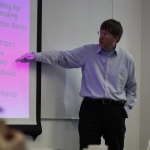 Professor Bill Callahan from International Relations presented on the changes to the Visual International Politics course IR318. Students were asked to work in small groups to produce and edit their own documentaries in order to combine academic analysis with the practical skills of documentary film making and give students an insight into the visual politics of IR. Professor Callahan worked with LTI to deliver five seminars on film production and gave students access to editing facilities. The final films were shared on a Vimeo group and showed in a final ‘film festival’ seminar. Feedback from the students was positive but many would like to increase the weighting of the film component from 25% to 50% of the final mark.
Professor Bill Callahan from International Relations presented on the changes to the Visual International Politics course IR318. Students were asked to work in small groups to produce and edit their own documentaries in order to combine academic analysis with the practical skills of documentary film making and give students an insight into the visual politics of IR. Professor Callahan worked with LTI to deliver five seminars on film production and gave students access to editing facilities. The final films were shared on a Vimeo group and showed in a final ‘film festival’ seminar. Feedback from the students was positive but many would like to increase the weighting of the film component from 25% to 50% of the final mark.
Slides from Dr Bill Callahan’s presentation
‘I have really enjoyed this course. The topics were very intellectually stimulating. I enjoyed the practical aspect the most although it was very challenging.’
——————————————————————————————————————————————————
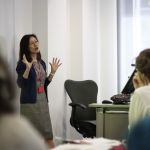 Dr Hyun-Jung Lee from the department of Management discussed the use of video in group work projects. Students on the post graduate courses ID419 and MG463 were put into groups with mixed backgrounds and had the option to create a short video to demonstrate case studies and theories on cross-cultural management.
Dr Hyun-Jung Lee from the department of Management discussed the use of video in group work projects. Students on the post graduate courses ID419 and MG463 were put into groups with mixed backgrounds and had the option to create a short video to demonstrate case studies and theories on cross-cultural management.
Slides from Dr Hyun-Jung Lee’s presentation
The films from the projects can be seen online and by clicking on the picture below
——————————————————————————————————————————————————
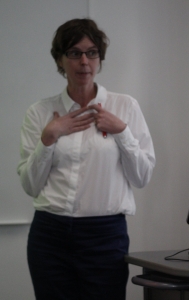 Sarah Paterson from the department of Law talked about her use of Moodle to develop students critical writing skills.
Sarah Paterson from the department of Law talked about her use of Moodle to develop students critical writing skills.
Moodle Wiki
Sarah used the Moodle Wiki to enable students to write collaboratively. This worked well although it took some time to check and edit student responses once they had completed their submissions.
Peer assessment using Moodle workshop tool
She used the workshop function on Moodle to get students to provide peer feedback on assessment. Each student was randomly allocated another students work and asked to mark it using the course assessment criteria.
Online feedback via the assessment tool
She also gave students the option of uploading writing exercises that they had done in class to a online assessment in order to receive feedback. The students really enjoyed being able to develop their writing skills in class but were reluctant to submit their assessments online. There was some discussion on how they could be encouraged to submit (by making the assessment anonymous for example).
——————————————————————————————————————————————————
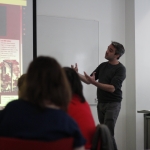 Dr Pete Manning from the department of Sociology shared his experiences of getting students to produce and curate material as part of their group presentations. Students used Prezi and Padlet to collect material on virtual pin-boards. The resources could then be used for exam revision and essay preparation. The students were asked to peer assess each presentation and were also asked to submit a self reflection on the exercise. The students enjoyed being given freedom to explore a subjects of their choice and it allowed them to share real world examples of concepts in a very theory heavy course. However the task did not count towards their final mark and did require extra work so ideally it would replace a summative task in the future.
Dr Pete Manning from the department of Sociology shared his experiences of getting students to produce and curate material as part of their group presentations. Students used Prezi and Padlet to collect material on virtual pin-boards. The resources could then be used for exam revision and essay preparation. The students were asked to peer assess each presentation and were also asked to submit a self reflection on the exercise. The students enjoyed being given freedom to explore a subjects of their choice and it allowed them to share real world examples of concepts in a very theory heavy course. However the task did not count towards their final mark and did require extra work so ideally it would replace a summative task in the future.
Slides from Dr Pete Manning’s presentation
——————————————————————————————————————————————————–
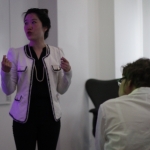 Dr Catherine Hua Xiang from the Language centre was awarded an LTI grant with kit to enable students studying Mandarin Chinese on LN808 and LN814 to work collaboratively to produce news reports on a global event or an interview on a current issue topic. The students were required to film themselves speaking Mandarin Chinese and then apply English subtitles to their finished project as part of their continuous course assessment. This project was very successful and the films can be used as a resource for future cohorts.
Dr Catherine Hua Xiang from the Language centre was awarded an LTI grant with kit to enable students studying Mandarin Chinese on LN808 and LN814 to work collaboratively to produce news reports on a global event or an interview on a current issue topic. The students were required to film themselves speaking Mandarin Chinese and then apply English subtitles to their finished project as part of their continuous course assessment. This project was very successful and the films can be used as a resource for future cohorts.
‘Although I spent a lot of time on the project, I really enjoyed it as we have real product and we have also been awarded a grade’
Slides from Dr Catherine Hua Xiang’s presentation
—————————————————————————————————————————————————–
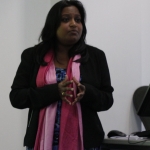 Siva Thambissetty from the department of Law gave students the option to submit a short video or series of images on Prezi or Slide share that explains an aspect of copyright infringement. Student feedback was generally positive with 60% recommending that the assignment continues next year.
Siva Thambissetty from the department of Law gave students the option to submit a short video or series of images on Prezi or Slide share that explains an aspect of copyright infringement. Student feedback was generally positive with 60% recommending that the assignment continues next year.
Slides from Siva Thambissetty’s presentation
‘Quite refreshing after three years of essays!’
——————————————————————————————————————————————————–
If you are interested in developing your own ‘students as producers’ project then you might want to apply for an LTI grant see our blog page for more details and contact us at LTI for some advice and to discuss your idea LTI.Support@lse.ac.uk





